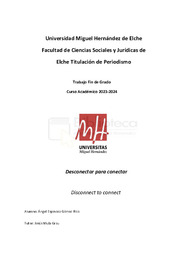Por favor, use este identificador para citar o enlazar este ítem:
https://hdl.handle.net/11000/33757Registro completo de metadatos
| Campo DC | Valor | Lengua/Idioma |
|---|---|---|
| dc.contributor.advisor | Mula Grau, Jesús | - |
| dc.contributor.author | Espinosa Gómez-Rico, Ángel | - |
| dc.contributor.other | Departamentos de la UMH::Ciencias Sociales y Humanas | es_ES |
| dc.date.accessioned | 2024-11-04T09:13:47Z | - |
| dc.date.available | 2024-11-04T09:13:47Z | - |
| dc.date.created | 2024-09 | - |
| dc.identifier.uri | https://hdl.handle.net/11000/33757 | - |
| dc.description.abstract | La inmediatez de la información, el frenesí del mundo periodístico o las pésimas condiciones laborales provocan que el día a día del periodista sea intenso e impredecible, impidiéndole desarrollarse en otras áreas de su vida personal. Esto puede afectar negativamente en el bienestar mental del profesional llegando a producir malestar emocional, burnout o incluso problemas psicológicos. La exposición constante a entornos tan volátiles como el periodismo, dónde lo que es actualidad deja de serlo en menos de 8 horas, fomenta la aparición de trastornos mentales tales como el estrés, la ansiedad o fatiga. Hasta un 67% de periodistas se ha sentido agotado o ha pensado en dejar la profesión según un estudio de la Asociación de Prensa de Madrid. En un entorno donde la falta de medios y concienciación sobre la salud mental es notable, referentes como Mar Cabra o María Miret reivindican que un mayor cuidado de la psique del gremio puede favorecer tanto al afectado como a la calidad informativa de sus piezas. | es_ES |
| dc.description.abstract | The immediacy of information, the frenzy of the journalistic world or the terrible working conditions cause the journalist's day-to-day life to be intense and unpredictable, preventing him/her from developing in other areas of his/her personal life. This can negatively affect the mental wellbeing of the professional, leading to emotional discomfort, burnout or even psychological problems. Constant exposure to such volatile environments as journalism, where what is current news ceases to be so in less than 8 hours, fosters the appearance of mental disorders such as stress, anxiety or fatigue. Up to 67% of journalists have felt exhausted or have thought about leaving the profession, according to a study by the Madrid Press Association. In an environment where the lack of resources and awareness of mental health is notable, leaders such as Mar Cabra and María Miret claim that greater care for the psyche of the profession can benefit both the person affected and the quality of information in their pieces. | es_ES |
| dc.format | application/pdf | es_ES |
| dc.format.extent | 26 | es_ES |
| dc.language.iso | spa | es_ES |
| dc.publisher | Universidad Miguel Hernández de Elche | es_ES |
| dc.rights | info:eu-repo/semantics/openAccess | es_ES |
| dc.rights | Attribution-NonCommercial-NoDerivatives 4.0 Internacional | * |
| dc.rights.uri | http://creativecommons.org/licenses/by-nc-nd/4.0/ | * |
| dc.subject | Salud mental | es_ES |
| dc.subject | periodista | es_ES |
| dc.subject | burnout | es_ES |
| dc.subject | precariedad | es_ES |
| dc.subject | estrés | es_ES |
| dc.subject | Mental health | es_ES |
| dc.subject | journalist | es_ES |
| dc.subject | precariousness | es_ES |
| dc.subject | stress | es_ES |
| dc.subject.other | CDU::0 - Generalidades.::070 - Periódicos. Prensa. Periodismo. Ciencias de la información | es_ES |
| dc.title | Desconectar para conectar | es_ES |
| dc.title.alternative | Disconnect to connect | es_ES |
| dc.type | info:eu-repo/semantics/bachelorThesis | es_ES |

Ver/Abrir:
TFG Definitivo.pdf
1,13 MB
Adobe PDF
Compartir:
 La licencia se describe como: Atribución-NonComercial-NoDerivada 4.0 Internacional.
La licencia se describe como: Atribución-NonComercial-NoDerivada 4.0 Internacional.
.png)